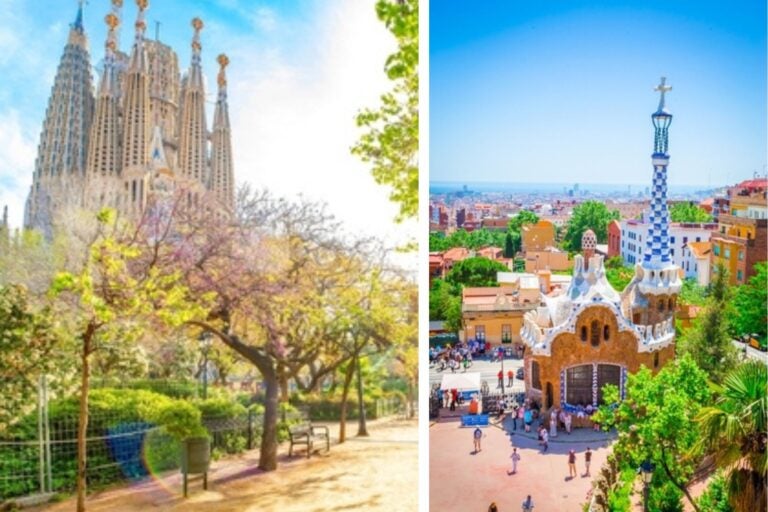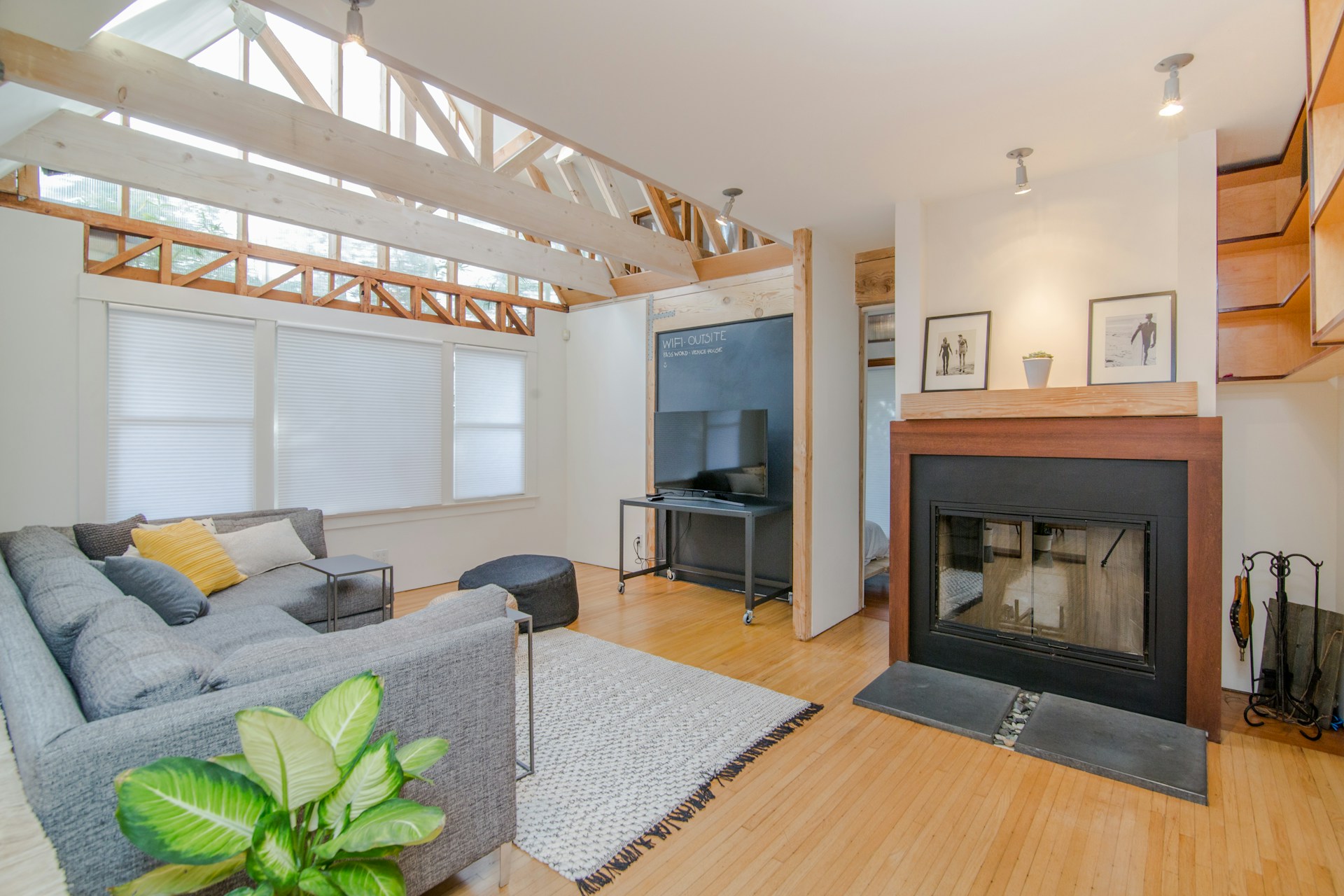What’s it like living in Barcelona as an expat?
Discover the attractions, challenges, and lifestyle of living in Barcelona as an expat in this vibrant, cosmopolitan city.
The Catalan capital can be an exceptionally appealing city to call home. In fact, many people moving to Spain choose it over Madrid, Valencia, or Seville. Its historic streets, urban beaches, vibrant cultural and gastronomic scene, and a lifestyle that balances work and leisure are just a few of the reasons. Want to know more? Here’s what life is really like living in Barcelona as an expat.
Barcelona has a charm all its own. It is Mediterranean, cosmopolitan and inviting. But before you move, it is important to do your research. Like any city, Barcelona has its advantages, but there are also aspects, especially the cost of living, that you need to consider.
To give you a complete picture of what life is like in Barcelona, we’ve put together this full guide. We explore how it feels to live there, highlighting both its strengths and challenges. By the end, you’ll have a much clearer idea of whether Barcelona could be your next home.
What is the quality of life like in Barcelona?
Barcelona attracts all kinds of people. Beach lovers enjoy the city’s sun and sand, history fans are fascinated by its rich past, architecture enthusiasts marvel at Gaudí’s creations, and anyone who loves good food will be delighted by the city’s vibrant culinary scene.
All of this makes Barcelona one of Spain’s most beloved cities. It strikes a balance between modern infrastructure, quality public services, and a lively urban environment full of opportunities. Of course, experiences can vary depending on the neighborhood, your budget, and the time of year. Keep in mind that it’s a major tourist city, with all the advantages and drawbacks that come with that.
Let’s take a closer look at some key aspects that shape quality of life everywhere and see how Barcelona measures up. We examine its education options and quality, healthcare access, street safety, cost of living, and more.
1- Public and private education
In Spain, public education is free from primary school through high school. So if you move to Barcelona with your children, you’ll have options including public, semi-private, and private schools, many offering programs in Catalan, Spanish, and even English or French.
- Private national and international schools operate independently of the Catalan public system, which can sometimes make enrollment faster. Still, some may require interviews, placement tests, or a motivation letter, especially if they are bilingual or international. In terms of cost, a national private school typically ranges around $430–760 per month, while an international private school usually charges $860–1,290 per month.
- Public schools in Barcelona are fully open to foreign students, regardless of nationality or immigration status. This means that even if you’re new to the city, you can enroll your children in a public school as long as you meet a few requirements, such as providing proof of residence in the municipality and submitting previous academic records from your home country.
- Semi-private schools are another accessible option. They are privately run but receive government funding, which keeps monthly fees lower, typically between $215 to $430. They follow requirements similar to public schools but offer more flexibility in terms of teaching methods and religious instruction.
2- Safety in Barcelona
One of the main concerns for anyone moving to a new city is safety. In this regard, you will be glad to know that Barcelona is among the safest cities in Europe, with low rates of violent crime and a strong police presence.
Like in any big city, petty theft can be an issue, especially in popular tourist spots such as La Rambla, the Gothic Quarter, and Barceloneta Beach. In more residential areas like Sarrià, Gràcia, or Poblenou, the streets feel much safer, and walking around at night is generally no problem.

3- Cost of living and accommodation: A problem of living in Barcelona
One of the biggest concerns for expats is the cost of living in Barcelona. It is known for being expensive, particularly compared with other Spanish cities. Rent is usually the largest expense, especially in the city center, and high demand combined with limited housing options keeps prices rising. Because of this, many people end up sharing apartments instead of living alone.
One way to save on housing in Barcelona is to consider coliving spaces, which can be an excellent and budget friendly option. These spaces are designed for digital nomads, remote workers, entrepreneurs, and sometimes students. They offer work areas, private or shared rooms, and all utilities at competitive prices. For example, CoLiveIt Liceu in the central Raval neighborhood costs between $645-1,290 per month, while renting a furnished apartment can run from $1,505 to $2,690 per month.
If you’re wondering what monthly budget you’ll need, we would say that living comfortably on your own is possible with around $1,290-2,170 per month.
4- Health system and medical care
Spain has a public, universal, and high-quality healthcare system, so you can move to Barcelona with peace of mind. If you have legal residency, you can access public healthcare for free, including doctor visits, emergency care, surgeries, and treatments. If not, it’s best to get private health insurance.
Having a good health insurance policy ensures that you will receive care in private clinics and hospitals with minimal waiting times in case of illness or emergency. In fact, most foreigners arriving on temporary visas choose this type of coverage, as paying out of pocket can quickly become a major headache.
5- Barcelona’s digital and technological infrastructure
Barcelona is a popular choice for digital nomads and remote workers because it offers some of the best digital infrastructure in Spain. With high-speed fiber-optic internet available (300 Mbps to 1 Gbps) across the city, you can easily work from home, a café, or a coworking space without interruptions.
If you’re a digital nomad, you’ll be happy to know that Barcelona feels tailor-made for remote work. The city has plenty of coworking spaces, public WiFi in key areas, and a thriving tech community that makes it easy to stay connected and productive.
If you’re moving to Barcelona, staying connected will be a top priority. One handy option is a monthly Holafly plan, designed for digital nomads, remote workers, students, and travelers. It provides unlimited data that you can share across devices and works in over 170 countries. Heading to Andorra, Portugal, or France? You won’t need a new eSIM and can enjoy the same service wherever you go.
What are the advantages of living in Barcelona?
Barcelona offers a unique mix you don’t often find: the energy of a big city with the charm of tight-knit neighborhoods, modern life alongside rich history, and a climate that makes spending time outdoors enjoyable all year. It’s no wonder so many people are choosing to make the city their home. Next, we’ll take a look at some of the main benefits of living in Barcelona.
1- Mediterranean lifestyle and pleasant climate
Barcelona enjoys a very comfortable climate, with abundant sunshine, mild winters, and hot summers. The warmest months run from May to August, while the coolest are December through February. Weather changes with the seasons, and although it rarely gets extreme, recent years have brought some unusually high temperatures.
Barcelona’s many beaches, both within the city and nearby, make it easy to escape the summer heat. Even during other seasons, the city encourages an outdoor lifestyle. Whether it’s running along the coast or enjoying a drink on a terrace at sunset, the weather helps shape a lifestyle that is relaxed, active, and social.
2- Efficient public transport and cycling as a way to get around
Getting around Barcelona is easy and affordable thanks to a reliable public transport system including metro, buses, and trains that covers the entire city and connects well with nearby towns. There are also bike lanes everywhere, along with services like Bicing and electric scooters that make short trips simple. Walking is also a great option, though some attractions are a bit farther apart. All of this means you can get by without a car, saving both money and stress.
Barcelona is also very well connected to the rest of the world. The airport is only 20 minutes from the city center and offers daily flights across Europe and around the world, so it’s usually easy to get a direct flight to Barcelona from your home city. On top of that, Sants train station provides high-speed AVE trains that can take you to other Spanish cities in just a few hours.
3- Multicultural and open city
Barcelona is one of Europe’s most cosmopolitan cities, a diversity you can see everywhere, from its streets and bars to its beaches and hidden corners. The city welcomes students, professionals, and artists from all over the world, creating a vibrant environment where different languages, traditions, and lifestyles coexist.
When you move to Barcelona, you will quickly start meeting people from your own country as well as from around the world. The city offers plenty of social opportunities for expats, from meetups to language exchange events such as Tandem or Language Exchange Barcelona. Coworking spaces, coliving communities, and sports centers also make it easy to build connections and enjoy a strong sense of community.
4- Rich cultural life and connection with nature
Barcelona offers endless things to see and do. From top-tier museums to lively street exhibitions, festivals, and free concerts in the parks, the city’s cultural life is always active and easy to enjoy. The local government supports a variety of events throughout the year, and certain neighborhoods are constantly buzzing. If you are passionate about art, design, music, or food, you will feel completely at home.
The areas surrounding Barcelona are perfect for weekend getaways to explore everything Catalonia has to offer. You can go hiking in the Montserrat mountains, follow wine routes in Penedés, or discover the villages, beaches, and coastal trails of the Costa Brava. In short, there is always an opportunity to unwind and enjoy nature.
5- Quality public healthcare
We already mentioned that one of the biggest perks for people moving to Barcelona is access to a public, universal, and free healthcare system. Both primary care centers and hospitals are staffed with skilled professionals and equipped with modern facilities.
While there can be delays in certain specialties, overall healthcare coverage is solid and reliable. If you prefer medical care in your own language or access to the city’s top clinics, you can always opt for health insurance to ensure full coverage.

What are the challenges of living in Barcelona as a foreigner?
Barcelona has a lot going for it, but moving here also comes with some unique local quirks to get used to. Being aware of these challenges ahead of time can make settling in much easier. To help you make the most of your time in the city, here are a few important things to know about living in Barcelona.
1- High cost of rent
As we mentioned earlier, Barcelona is not a cheap city to live in, especially when it comes to housing, which takes up a significant part of your monthly budget. In central or well-connected neighborhoods like Eixample, Gràcia, or Poblenou, finding an apartment that offers good value requires time, active searching, and flexibility.
If you want a tip, consider focusing on more residential areas or neighborhoods farther from the city center, like Sants or Sant Andreu. You could also look for rooms in shared apartments or temporary rentals while you search for a long-term place.
2- Labor competition and bureaucracy to work legally
If you plan on living in Barcelona, another challenge is entering a job market that is lively but very competitive. For non-EU citizens, getting a work permit can take time and involve a lot of bureaucracy. Many jobs also require strong Spanish or Catalan skills, which can make finding work more difficult at first.
If you do not have European citizenship, our advice is to check in advance what is required to work legally. Often, having strong language skills or a technical background, such as in IT or UX design, can increase your opportunities.
3- Slow procedures and decentralized administration
Getting registered, securing a NIE (Foreigner Identification Number), or handling visa paperwork can take more time than you might expect. Appointments are often hard to get, and some processes still need to be done in person, which can be frustrating in today’s digital world.
So if you need to handle any of these procedures, be prepared for some patience. You can also check expat forums or groups for tips and shortcuts, or hire a professional consultant. While this may increase your expenses, it can save you a lot of time and make the process much smoother.
4- High tourist density during peak seasons
Barcelona is one of Europe’s most popular destinations. Iconic landmarks like the Sagrada Familia, La Pedrera, Barceloneta Beach, and Park Güell draw millions of visitors every year. On top of that, the city is also the perfect gateway to explore the rest of Catalonia and its many attractions.
That being said, if you choose to make Barcelona your home, you’ll quickly notice that tourism is part of everyday life here. The city is busy year-round, which means higher prices in some areas, crowded streets, and the occasional long wait if you want a table at a trendy restaurant.
Neighborhoods like the Gothic Quarter or El Raval are usually packed with visitors. If you want a calmer lifestyle, it helps to look for housing in areas farther from the center. You can also adjust your routine by visiting popular places earlier in the day or outside busy hours to avoid the tourist crowds.
5- Difficulties in entering the real estate market
Finding a place to live in Barcelona isn’t just about balancing your budget. Landlords often ask for things like an employment contract, a guarantor, or several months of rent upfront. That can make the process tricky for newcomers or anyone who’s self-employed.
That said, if you’re patient and willing to do some digging, you’ll find plenty of options for longer stays. Think furnished apartments on Airbnb, coliving spaces, student residences, or even hotels that offer discounts for stays of three weeks or more. The safest bet is to use well-known platforms like Idealista or Spotahome and start off with a temporary place until you’re more settled.
Taking all of this into account, we believe that living in Barcelona is well worth it. You do not need to commit permanently. You can spend a few months or even a year enjoying everything the city has to offer and soaking up its cosmopolitan atmosphere.
Frequently asked questions about living in Barcelona
Whether you need a visa depends on where you are from. EU passport holders can live and work in Spain freely, while people from outside the European Union will need a residence visa. This could be for studying, working, joining family, or living as a digital nomad.
The average cost of living in Barcelona varies depending on several factors. A single person typically needs $1,290 to $2,150, depending on housing, lifestyle, and neighborhood. Rent is usually the biggest expense, followed by food and transportation. For couples or families, the budget increases accordingly.
Yes, though demand is high. Options like furnished apartments, short-term rentals, coliving spaces, and student residences allow you to stay without committing to a long-term lease. The most popular platforms for finding this kind of housing include Airbnb, Idealista, Fotocasa, Badi, and Spotahome.
You can work in Barcelona, but only if you have the proper work permit. EU citizens do not need extra paperwork, while non-EU residents must apply for the right visa or meet the requirements to work as a freelancer. Avoid working unofficially, as it can lead to legal trouble and make it harder to secure residency later.
While Spanish is widely spoken, having a good command of Catalan can help you integrate and improve your job prospects. The good news is that there are many free or low-cost places to learn the language. For example, the Consorci per a la Normalització Lingüística (CPNL) is the main public institution for studying Catalan. They offer courses at all levels, from beginner to advanced, both in person and online, at very affordable rates.





 Language
Language 


















 No results found
No results found








